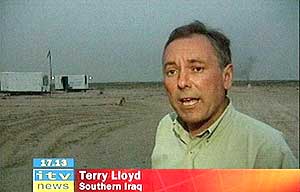Coroner seeks trial for US troops who killed TV man
 A coroner in a British court has ruled that respected British TV journalist Terry Lloyd was unlawfully killed by American troops and intends to press for their prosecution in British courts.
A coroner in a British court has ruled that respected British TV journalist Terry Lloyd was unlawfully killed by American troops and intends to press for their prosecution in British courts.
The Pentagon issued a typically bland statement saying that it, "never deliberately targeted non-combatants, including journalists". This general statement deliberately ignores the specifics of the incident in question.Andrew Walker, the assistant deputy coroner for Oxfordshire, said yesterday he would be writing to the attorney general and the director of public prosecutions "to see whether any steps can be taken to bring the perpetrators responsible for this to justice".
The verdict was welcomed by Lloyd's family, employers and the National Union of Journalists. His widow Lynn accused US forces of allowing soldiers to "behave like trigger-happy cowboys in an area in which there were civilians travelling on a highway". In a statement she said: "The marines who fired on civilians and those who gave those orders should now stand trial. Under the Geneva Conventions Act, that trial should be for the murder of Terry Lloyd and nothing less."
Lloyd's daughter Chelsey, 24, said: "My father was unlawfully killed by a bullet to the head from a heavy-calibre machine gun fired by US marines. The killing of my father would seem to amount to murder."
Mr Lloyd was shot through the head as he lay wounded in a makeshift ambulance that was attempting to leave the scene.Lloyd, 50, was killed on the morning of March 22 at a bridge on the road to Basra. He and his team were working independently of the military, and was injured in the crossfire between US and Iraqi forces. It was while he was being taken to hospital in a civilian vehicle that he received a fatal bullet in the head from American guns. The coroner said he had "no doubt" this was "an unlawful act".
The coroner reserved particular anger for the US soldiers who refused to attend the inquest to give their account. Instead, they gave statements to the court.
Mr Walker said: "I have no doubt Mr Lloyd was killed by a tracer bullet fired from an American gun. This injury was received after Mr Lloyd had been placed in the rear of the minibus and was consistent with a hole in the back of the minibus ... In my view, I have no doubt that the minibus presented no threat to the American forces. It was obvious that wounded persons were getting into the vehicle."
The US soldiers did not fire in self-defence, he ruled. Had the killing taken place under English law "it would have constituted an unlawful homicide".
The US have so far made no attempt to identify which of their troops carried out the fatal shooting. This behaviour strikes me as extraordinary when one reads accounts of what actually took place:
Mistakes are made in times of war and innocent people are killed. However, what rankles here is that the American military appear to be treating the death of Mr Lloyd as a thing of no importance and find it almost irksome that the British would like them to identify the shooter.Lloyd, who was interviewing civilians about their reaction to the invasion, was first shot in the back by Iraqi soldiers when caught in the crossfire between Iraqi and American troops trying to gain control of the city of Basra. A ballistics expert Dr Thomas Warlow said he could have survived with rapid medical treatment.
American troops then started firing at both the clearly marked television vehicles driven by the ITN team. Lloyd was killed outright when he was hit in the head by an American bullet as he was being taken for medical treatment by an Iraqi civilian. "I am sure it was the intention of those who opened fire to kill or cause serious injury to those inside the minibus," Mr Walker said.
"I have no doubt it was the fact that the vehicle stopped to pick up survivors that prompted the Americans to fire at the vehicle."
Mr Lloyd's Lebanese interpreter, Hussein Osman, was also killed on 22 March 2003 and a French cameraman, Fred Nerac, remains missing, presumed dead.
A Belgian cameraman, Daniel Demoustier, was the only survivor from the ITN team.
Mr Demoustier told the inquest that "all hell broke loose" and he was "100 per cent certain" that he was going to die.
Bland statements like this one:
A US Defence Department spokesman said that an investigation into the incident in May 2003 "determined that US forces followed the applicable rules of engagement".offers little condolence to the Lloyd family. A tragedy took place here. The Americans would do well to acknowledge this. Nor should they forget that Mr Lloyd was a much loved and respected British journalist and that the British are their main allies in the war on terror.
As the National Union of Journalists said at the time:
"We owe it to Terry Lloyd to get a full explanation of what happened yesterday."And we will never get a full explanation until the Pantagon decide to co-operate. The very least the Pentagon can do is to take this matter seriously. And that would mean attempting to identify the shooter. Is this too much to ask of an ally?
Click title for full article.
tag: Terry, Lloyd, British, journalist, killed, unlawful, killing, , Iraq, Iraq war, casualties, human rights























No comments:
Post a Comment